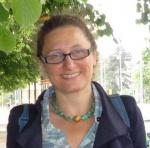
Susanna Terracini
- Born inItaly
- Studied inItaly
- Lives inItaly
Interview
From EWM Newsletter n°23 (2013/2)
Susanna Terracini obtained her PhD degree at SISSA (Trieste) in 1990. From 1992 to 2001 she was associate professor of Mathematical Analysis. She is a full Professor at the University of Milano Bicocca since 2001. She is the author of about 85 papers, published in major international mathematical journals and is on the editorial board of a number of national and international journals. She has been invited to speak at many Italian and foreign institutions such as MSRI, School of Mathematics in Minneapolis, Paris VI and IX, the Paris Astronomic Observatory, the Courant Institute in New York, Winsconsin University at Madison, Rutgers University, CMAF in Lisbon and EPF in Lausanne. She was invited as a plenary speaker to many international conferences, notably to the Equadiff2003 meeting, the IV and V International Meeting on Celestial Mechanics 2004-2006, the Jean Leray Centennial Conference in 2006, the XIV Rivière-Fabes Symposium, the XIX Congresso dell’Unione Matematica Italiana and the 9th AIMS Conference on Dynamical Systems, Differential Equations and Applications in 2012. She was awarded the C. Vinti prize in 2003 and the B. Finzi prize in 2007. She is the principal investigator of the Research Project of National Insterest (PRIN2009) project Critical Point Theory and Perturbative Methods for Nonlinear Differential Equations. She is the principal investigator of the ERC Advanced Grant No 339958 – COMPAT, Complex Patterns for Strongly Interacting Dynamical Systems. Her joint paper with D.L. Ferrario “On the Existence of Collisionless Equivariant Minimizers for the Classical n-body Problem” published in Inv. Math. was selected as “featured review” on Math Reviews.
EWM: How did you decide to become a mathematician?
ST: I was unsure of what I wanted to study to begin with, I wanted something scientific, but didn’t know whether to choose mathematics, engineering or agriculture. So I went to some courses and there had the personal feeling that maths was for me. So it was not, so to speak, a vocation, rather a discovery that I really enjoyed studying mathematics. It was not always easy to understand, but the effort was enjoyable and it still is.
EWM: Can you describe your career steps? The system now in Italy for becoming a professor seems to be tough, how did it happen for you?
ST: The system has changed over time, becoming harder. I obtained my PhD at SISSA in Trieste, which was a great boost, as in this time the doctoral programs in Italy really were not working at all. Except at SISSA in Trieste, and in few other institutions, such as Scuola Normale in Pisa, the culture was much different. There were many positions available when I finished and I got a permanent position very soon. Next I passed national and local competitions and I got a full professorship in 2002. I have been very lucky!
Full professors, especially the subset of very powerful ones, are usually men in Italy. At some crucial times in my career, I feel my opinions within my past department have not been considered properly, or even at all. Decisions are made in a very hierarchical way, by a small group of male professors. This is why I changed institution several times. My present Department in Torino has a large majority of women full professors holding all the top positions. We’ll see…
EWM: Can you describe your main areas of research and your main contributions to these areas?
ST: My research interests include different directions in the field of nonlinear analysis with application to the variational approach to chaotic and complex trajectories in Hamiltonian dynamical systems, especially in celestial mechanics and pattern formation mechanisms for nonlinear reaction diffusion and Schroedinger systems.
EWM: Do you feel you have achieved a good work/life balance?
ST: My husband is also a mathematician, in a neighbouring field, and we have only one child. When he was young, it was more difficult for travelling and so on, but we had the opportunity of traveling all together. Italian universities are not well organised for childcare, it is difficult to find good public childcare. Usually, people would rely on grandparents, but of course this is not possible with the mobility of modern careers. The general trend for non-permanent positions is very bad for the whole mathematical community, but particularly for women. Personally, I always feel at some debt, either to my son, or my husband, or work, or my students, always running from one to the other.
